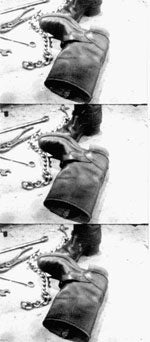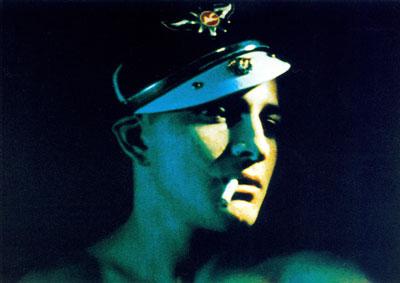Kenneth Anger is one of the giants of American underground and experimental filmmaking. His films draw on wide-ranging iconography, from commedia dell'arte to Hollywood and a wide variety of 20th century subcultures: the worlds of bikers, occultists and queers. This iconography is presented in a variety of ways, from documentary footage to elaborate mise-en-scène to Eisensteinian montage, but always the result is an eruption of the primal into the modern.
Anger grew up in Los Angeles. and his work grows out of a love of Hollywood. He began making films as a teenager; the earliest of his films to survive is also his first masterpiece, Fireworks (1947), an erotic fantasia about a young man cruising sailors for sex. As Anger famously put it, "This flick is all I have to say about being 17, the United States Navy, American Christmas and the 4th of July."

Rabbit's Moon (1971) presents the commedia dell'arte figure of Pierrot in Anger's tribute to the fantastical films of Georges Méliès. The version to be presented tonight is a reconstruction of the original long version. Originally shot on 35mm nitrate stock, footage for the film was then transferred to 16mm for editing, so Rabbit's Moon has only been seen in that format. Tonight's screening will mark the first time ever that the film has been projected in 35mm.ln addition, the image was flipped (i.e, reversed from right to left, as in a mirror), a change corrected by this reconstruction, so that the image will now appear as it did when Anger originally filmed it. (Mr. Anger has authorized this correction.)

Scorpio Rising (1963) is rightly Anger's best-known work. The film mixes documentary footage of 1960s bikers, found footage from a religious film on Jesus, and fetishistic footage of biker iconography, all set to a top-40 pop score.
Kustom Kar Kommandos (1965) was shot as a short "demo" for a never-produced film on custom car aficionados. Against a hot pink background, a young man lavishes loving attention on his car as Anger's camera lavishes loving attention on his muscular body clad in a T-shirt and tight blue jeans. The film's title even acts as a distillation of Anger's aesthetic: the deliberate misspellings are pure pop while also creating a calculatedly provocative acronym.
Anger's groundbreaking combination of montage editing, popular music and outlaw imagery has influenced filmmakers as diverse as Martin Scorsese, Rainer Werner Fassbinder, Olivier Assayas and David Lynch. Music video and queer cinema would not be what they are were it not for Anger's films from the 1940s through the '70s. The Archive is proud to be working with Mr. Anger to preserve his work.
–David Pendleton






 Mobile Navigation
Mobile Navigation

